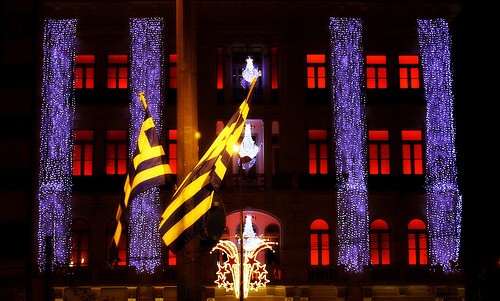Religion plays an important part in the lives of the Greek people. The predominant faith is Greek Orthodox, and although Christmas is celebrated, it isn’t considered to be as important as Easter. However, since joining the European Union, the number of foreigners moving to Greece has risen, and they have brought their own Christmas traditions with them. There are also more American and British films on television, and these have introduced the Greeks to other Christmas customs. As a result, Christmas has become a bigger occasion in Greece. However, while they have adopted some foreign traditions, most Greeks still maintain many of their old habits and beliefs.
The Christmas season in Greece begins on December 6, the feast of Saint Nicholas, and continues until the Epiphany on January 6. On both December 6 and New Years Day, presents are exchanged. In many countries, Saint Nicholas is the original Father Christmas, but this is not the case in Greece. Here he is the patron saint of sailors. The Greek Father Christmas is Saint Basil, and his feast day is New Years Day.
Until recently, Christmas lights weren’t common in Greece, but now they adorn both the houses and the streets. Christmas trees were also rare, but they are widely found today, and it is easy to purchase both real and artificial trees. However, in some areas of Greece, the influx of other traditions is not popular, and some people have started decorating boats instead of trees. The sea is an important part of life in Greece, and the ship is one of the symbols of the country. Greek ships always sail with an icon of Saint Nicholas on board.
Symbol
The traditional symbol of the Christmas season is a shallow wooden bowl with a wire suspended across the rim. A sprig of basil is wrapped around a wooden cross and then hung on the wire. Each day, the house is blessed by dipping the basil and the cross in holy water. This ritual is supposed to keep away the killikantzaroi. They are half-animal, half-human monsters, which appear only in the twelve days between Christmas Day and January 6. As they enter homes through the chimney, fires are kept burning throughout this period to keep them out, a completely different concept to the Santa Claus myth.
On Christmas Eve and New Years Eve, the children sing kalanda (carols) from house to house. As an accompaniment, they play small metal triangles. The carols are a blessing for the homes, and the children are rewarded with sweets or dried fruits.
The Greeks celebrate the birth of Christ on December 25. The family is a very important part of Greek life, and on this day a large meal is shared with all the relatives. The traditional Christmas dish is pork, but turkey is also now part of the feast in many homes. Pastries are very popular in Greece, and many varieties of traditional pastries are enjoyed at Christmas. Three very popular ones are melomokarona, which are honey-dipped cookies filled with nuts, kourambiedes, cookies dusted with icing sugar, and diples, which are fried dough cookies dipped in honey. Loaves of Christopsoma (Christ bread) are also baked, and a cross decorates these loaves.
January 1 is a day of parties and celebrations. It is also the occasion when the ‘renewal of the waters’ is celebrated. The water jugs are emptied and then refilled with new ‘St Basil’s water’.
The Christmas season ends on January 6, the feast of the Epiphany, which is a national holiday in Greece. The Epiphany celebrates the anniversary of Christ‘s baptism, and it is when the waters are blessed. The local priests will bless a cross and then throw it into the sea. The men then dive into the water in an attempt to retrieve the cross, and the person who finds it is supposed to have good luck for the coming year.
As can be seen, Greece has its own special Christmas traditions, which are now interwoven with customs from other countries. It is an exciting and interesting place to visit during the holiday season, particularly if you want to experience an unusual and unique Christmas.
Photo credit: christine

